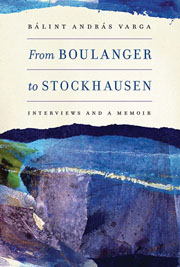Book contents
- Frontmatter
- Dedication
- Contents
- Foreword
- Acknowledgments
- Part One Interviews
- Preface to the Interviews
- Composers
- Conductors
- Instrumentalists
- Singers and a Record Producer
- A Teacher
- Music Administrators
- Snippets
- Claudio Abbado
- Sir Neville Cardus
- Aaron Copland
- Antal Doráti
- Géza Frid
- Sylvia Goldstein
- Ralph Kirkpatrick
- Witold Lutosławski
- Vlado Perlemuter
- Arthur Rubinstein
- György Sándor
- Walter Susskind
- Joseph Szigeti
- Part Two A Memoir
- Notes in Retrospect
- Index
- Miscellaneous Endmatter
Joseph Szigeti
from Snippets
Published online by Cambridge University Press: 05 January 2014
- Frontmatter
- Dedication
- Contents
- Foreword
- Acknowledgments
- Part One Interviews
- Preface to the Interviews
- Composers
- Conductors
- Instrumentalists
- Singers and a Record Producer
- A Teacher
- Music Administrators
- Snippets
- Claudio Abbado
- Sir Neville Cardus
- Aaron Copland
- Antal Doráti
- Géza Frid
- Sylvia Goldstein
- Ralph Kirkpatrick
- Witold Lutosławski
- Vlado Perlemuter
- Arthur Rubinstein
- György Sándor
- Walter Susskind
- Joseph Szigeti
- Part Two A Memoir
- Notes in Retrospect
- Index
- Miscellaneous Endmatter
Summary
In the Introduction to his autobiography My First 79 Years, Isaac Stern lists Joseph Szigeti among violinists who were of “immense importance” for him. He adds: “He was one of the most profound musicians I have ever known, and a very good friend.” Describing Szigeti's rendition in the mid-forties of Brahms's G-Major Sonata for violin and piano (with Nikita Magaloff), Stern says: “It was one of the most ennobling performances I have ever heard. Nobody in the hall breathed. You were not listening to a performance of someone standing on the stage at Carnegie Hall; you were surrounded by a golden aura of music.”
By the time I met Szigeti in Budapest in September 1968, he had long since stopped playing the violin. He looked older than his seventy-six years. The skin of his face and hands was like parchment; his voice was weak and unsteady. He seemed to find it difficult to produce words, with long pauses between sentences. During the interview, he never looked at me but somewhere in the distance. Asking him questions was like an act of cruelty, so I kept the interview short—far shorter than I would have wished.
Szigeti had agreed to be a patron of the International Music Competition in Budapest (the other patron, Pablo Casals, had canceled his visit). The competition included one for string quartets. Prior to meeting Szigeti, I had talked to a member of the jury, the British violinist and quartet player Sidney Griller.
- Type
- Chapter
- Information
- From Boulanger to StockhausenInterviews and a Memoir, pp. 262 - 264Publisher: Boydell & BrewerPrint publication year: 2013



